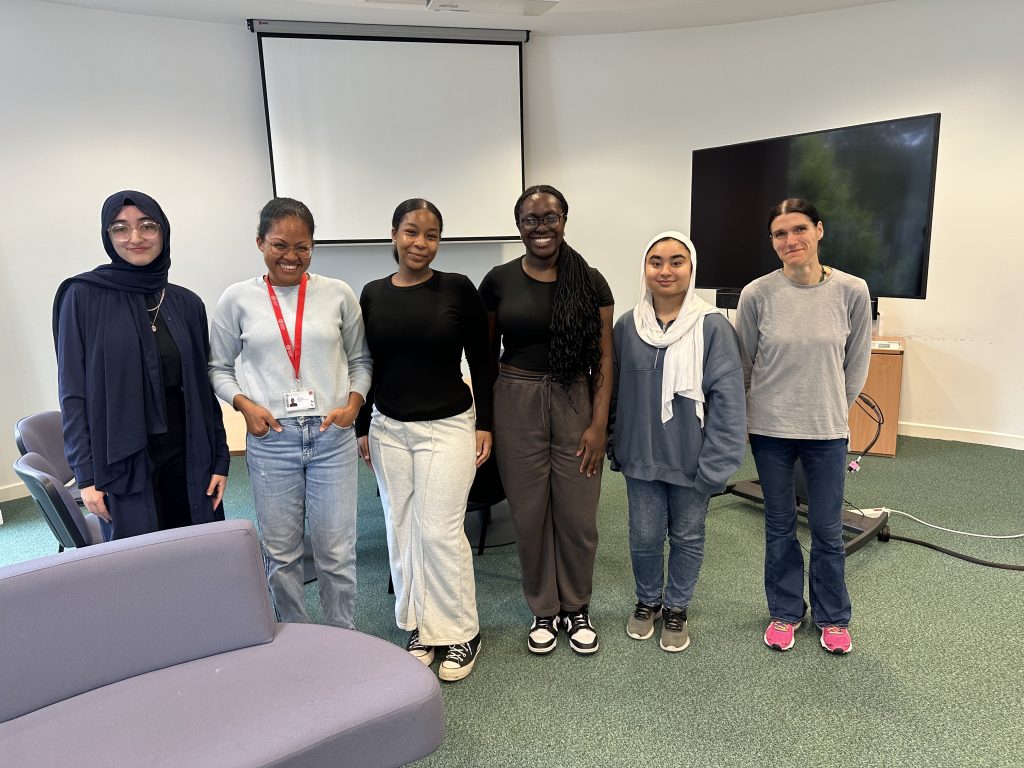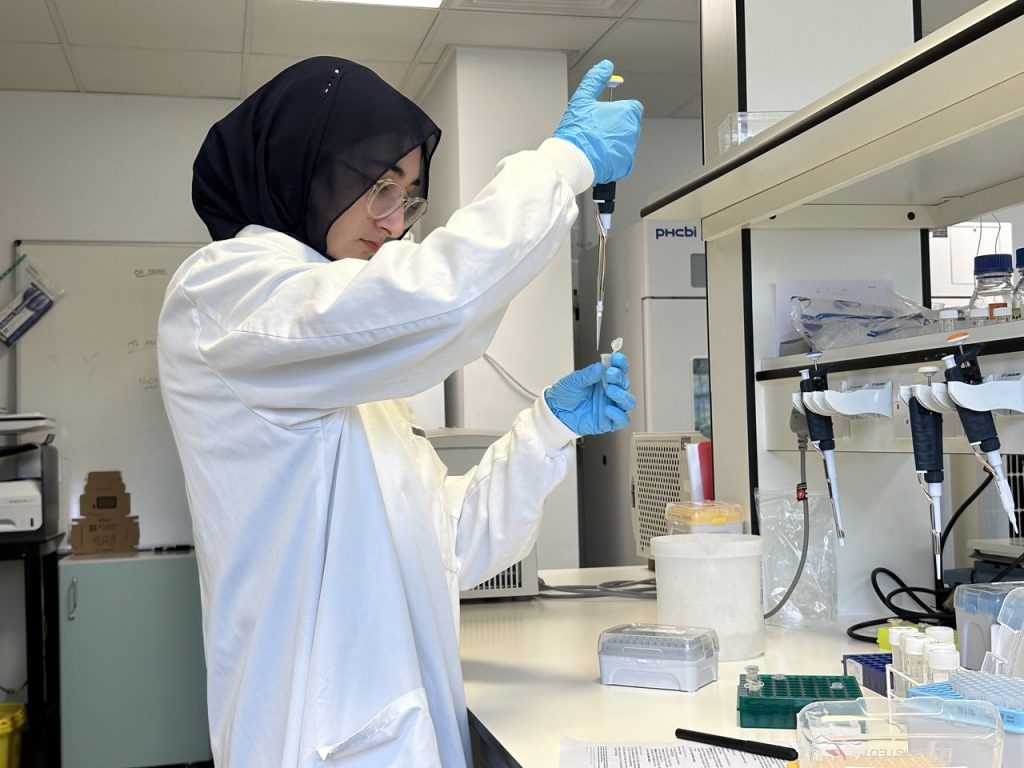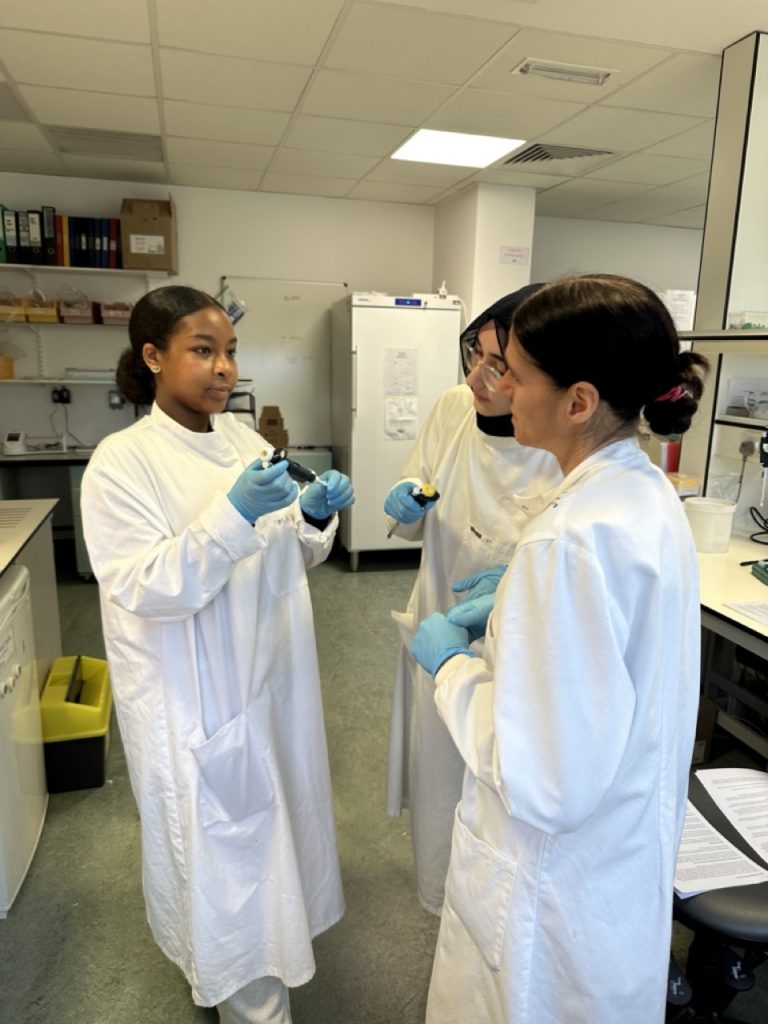
The Wales Cancer Research Centre (WCRC) recently hosted four Year 12 students as part of the In2STEM work experience programme. The students had the unique opportunity to immerse themselves in the field of cancer and genetics, working alongside WCRC researchers Dr Ashley Poon-King, Dr Namrata Rastogi, and Dr Kate Liddiard.
In2STEM, formerly known as the In2science summer program, is a transformative week-long initiative tailored for 16-19-year-olds with a passion for Science, Technology, Engineering, and Mathematics (STEM). The programme aims to unlock the potential of young people from disadvantaged backgrounds, fostering diversity and inclusion within the STEM sector to keep the UK at the forefront of these industries. Taking place over the summer, In2STEM combines online and in-person activities, providing participants with the skills, knowledge, and confidence needed to thrive in STEM fields.
Students hosted at University Hospital Wales and the Hadyn Ellis Building spent a week with the WCRC Cancer and Genetics team, who organised a packed schedule of hands-on activities and insightful talks. The programme included learning protein preparation, quantification, and Western blotting techniques with Dr Namrata Rastogi, and a session on biobanking and informed consent, followed by training in tumour lysis with Dr Ashley Poon-King and human cell culture techniques with Dr Kate Liddiard. The students also engaged in blood preparations and DNA extractions with Dr Liddiard, toured the clinical trials unit, and attended a talk by the trials nurse department lead. The week concluded with agarose gel electrophoresis with Dr Liddiard, a discussion on cancer treatments with Dr Poon-King, a radio imaging seminar, and a final Q&A session and career discussion.

Mary Metezai, one of the participating students, praised the researchers for their mentorship. “Dr Kate and Dr Ashley hosted us for a couple days at the Cancer & Genetics building where we were taught how to extract DNA from a tumour cell and then separate fragments based on size by Gel electrophoresis. Our hosts mentored us well and made the whole week very enjoyable. We were able to witness the warm workplace environment and learn about their individual research projects.”
Mary highlighted a particularly impactful experience:
“We were able to follow Dr Ashley to the hospital and help her collect a real tumour cell sample from a patient with cancer in the head and neck region from the storage facility in the Wales Cancer Biobank. In addition, we were given a tour of the clinical trials unit at the hospital and a presentation on the various phases in drug trials before new treatments are given out to the public. We also joined a Microsoft Teams meeting with clinical oncologists and consultants and saw CT scans of patients with cancer. We listened to them discuss and show each other the regions where radiation would be given to remove the tumour and ensure it is gone forever.
This whole experience allowed me to know what it is like to be a real scientist and get hands on into lots of experiments using specialist equipment I’ve never used before. But most importantly, the researcher’s knowledge was the most valuable thing I got from this experience as I now know much more about cancer and how treatments like radiotherapy are administered. I also loved being able to listen to their experiences throughout their career and how it has shaped them.”

Dr Kate Liddiard said: “It was really enjoyable having the students in the lab. They were bright, engaged, and enthusiastic. They asked insightful questions and were excellent with practical lab skills. The experience also allowed me to learn more about Ashley’s clinical career and workload. Overall, the joint effort from researchers with different skills and roles provided a rich learning experience and reinforced research networks within the WCRC.”
Dr Ashley Poon-King said: “We spent a fantastic week with the In2STEM students who had the chance to observe the collaborative approach to enable effective translational research, through to its implementation through early phase clinical trial. Thanks to Sarah Harrhy and Paola Foulkes who facilitated the student visits to the Clinical Research Facility and Wales Cancer Biobank.”
The WCRC Researchers offered an exceptional learning opportunity for the students, providing them with practical lab skills, exposure to real-world research, and insights into potential STEM careers. Our thanks go to Dr Poon-King, Dr Rastogi, and Dr Liddiard whose collaboration and mentorship were instrumental in making the week a resounding success.